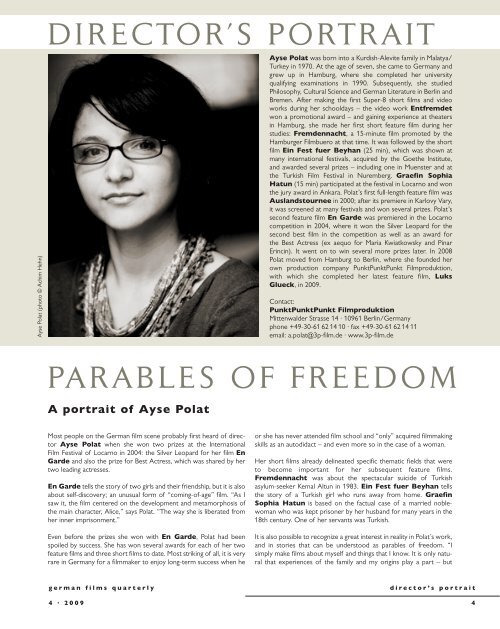Quarterly 4 · 2009 - German Films
Quarterly 4 · 2009 - German Films
Quarterly 4 · 2009 - German Films
Create successful ePaper yourself
Turn your PDF publications into a flip-book with our unique Google optimized e-Paper software.
Ayse Polat (photo © Achim Hehn)<br />
DIRECTOR’S PORTRAIT<br />
Ayse Polat was born into a Kurdish-Alevite family in Malatya/<br />
Turkey in 1970. At the age of seven, she came to <strong>German</strong>y and<br />
grew up in Hamburg, where she completed her university<br />
qualifying examinations in 1990. Subsequently, she studied<br />
Philosophy, Cultural Science and <strong>German</strong> Literature in Berlin and<br />
Bremen. After making the first Super-8 short films and video<br />
works during her schooldays – the video work Entfremdet<br />
won a promotional award – and gaining experience at theaters<br />
in Hamburg, she made her first short feature film during her<br />
studies: Fremdennacht, a 15-minute film promoted by the<br />
Hamburger Filmbuero at that time. It was followed by the short<br />
film Ein Fest fuer Beyhan (25 min), which was shown at<br />
many international festivals, acquired by the Goethe Institute,<br />
and awarded several prizes – including one in Muenster and at<br />
the Turkish Film Festival in Nuremberg. Graefin Sophia<br />
Hatun (15 min) participated at the festival in Locarno and won<br />
the jury award in Ankara. Polat’s first full-length feature film was<br />
Auslandstournee in 2000; after its premiere in Karlovy Vary,<br />
it was screened at many festivals and won several prizes. Polat’s<br />
second feature film En Garde was premiered in the Locarno<br />
competition in 2004, where it won the Silver Leopard for the<br />
second best film in the competition as well as an award for<br />
the Best Actress (ex aequo for Maria Kwiatkowsky and Pinar<br />
Erincin). It went on to win several more prizes later. In 2008<br />
Polat moved from Hamburg to Berlin, where she founded her<br />
own production company PunktPunktPunkt Filmproduktion,<br />
with which she completed her latest feature film, Luks<br />
Glueck, in <strong>2009</strong>.<br />
Contact:<br />
PunktPunktPunkt Filmproduktion<br />
Mittenwalder Strasse 14 <strong>·</strong> 10961 Berlin/<strong>German</strong>y<br />
phone +49-30-61 62 14 10 <strong>·</strong> fax +49-30-61 62 14 11<br />
email: a.polat@3p-film.de <strong>·</strong> www.3p-film.de<br />
PARABLES OF FREEDOM<br />
A portrait of Ayse Polat<br />
Most people on the <strong>German</strong> film scene probably first heard of director<br />
Ayse Polat when she won two prizes at the International<br />
Film Festival of Locarno in 2004: the Silver Leopard for her film En<br />
Garde and also the prize for Best Actress, which was shared by her<br />
two leading actresses.<br />
En Garde tells the story of two girls and their friendship, but it is also<br />
about self-discovery; an unusual form of “coming-of-age” film. “As I<br />
saw it, the film centered on the development and metamorphosis of<br />
the main character, Alice,” says Polat. “The way she is liberated from<br />
her inner imprisonment.”<br />
Even before the prizes she won with En Garde, Polat had been<br />
spoiled by success. She has won several awards for each of her two<br />
feature films and three short films to date. Most striking of all, it is very<br />
rare in <strong>German</strong>y for a filmmaker to enjoy long-term success when he<br />
or she has never attended film school and “only” acquired filmmaking<br />
skills as an autodidact – and even more so in the case of a woman.<br />
Her short films already delineated specific thematic fields that were<br />
to become important for her subsequent feature films.<br />
Fremdennacht was about the spectacular suicide of Turkish<br />
asylum-seeker Kemal Altun in 1983. Ein Fest fuer Beyhan tells<br />
the story of a Turkish girl who runs away from home. Graefin<br />
Sophia Hatun is based on the factual case of a married noblewoman<br />
who was kept prisoner by her husband for many years in the<br />
18th century. One of her servants was Turkish.<br />
It is also possible to recognize a great interest in reality in Polat’s work,<br />
and in stories that can be understood as parables of freedom. “I<br />
simply make films about myself and things that I know. It is only natural<br />
that experiences of the family and my origins play a part – but<br />
german films quarterly d irector’ s p ortrait<br />
4 <strong>·</strong> <strong>2009</strong> 4

















